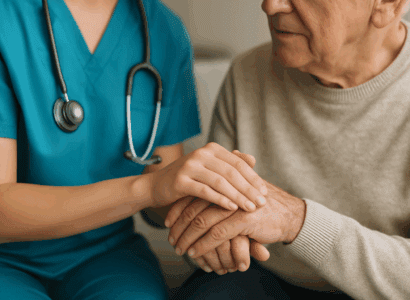Moving to Germany as a nurse brings exciting opportunities, but let’s face it—mastering medical German can feel like learning a whole new language (because it is). Between tongue-twisting compound words and unique idioms, it’s easy to feel like you’re starring in your own medical sitcom. To make things easier (and a little more fun), here’s a quick guide to essential and quirky German medical terms every foreign nurse should know.
The Basics: Words You’ll Use Every Day
- Blutdruck (Blood Pressure)
Whether high (hoch) or low (niedrig), this is a term you’ll say dozens of times a day. Bonus points if you can pronounce Blutdruckmessgerät (blood pressure monitor) without pausing for breath. - Thromboseprophylaxestrümpfe (Compression Stockings)
This isn’t just a medical term—it’s a test of endurance. When in doubt, just call them “TP Strümpfe.” - Fieberthermometer (Fever Thermometer)
It might sound like a word from a sci-fi movie, but it’s just a thermometer. Still, it’s worth practicing because German patients expect their nurses to say it with confidence! - Krankenakte (Medical Record)
A word as serious as the files it refers to. Keeping your Krankenakte in order is as important as mastering the word itself. - Zäpfchen (Suppository)
Let’s not sugarcoat it—this one is both tricky to pronounce and awkward to explain. The key is to stay professional and remember that the word itself is far less painful than its application.
Common Patient Complaints (And What They Actually Mean)
- Schwindel (Dizziness)
A patient saying, “Mir ist schwindelig,” means they’re feeling dizzy. The word may sound cute, but the condition definitely isn’t. - Übelkeit (Nausea)
If someone tells you, “Mir ist übel,” grab that kidney bowl—it’s about to get real. - Kreislaufprobleme (Circulatory Problems)
Often used by patients to describe anything from feeling faint to being tired, this is a catch-all term that might not require the full-blown emergency response it seems to imply.
Fun but Useful Words
- Bettpfanne (Bedpan)
It might not be glamorous, but it’s essential. At least the word itself is straightforward—and a bit funny if you think about it. - Pflaster (Bandage)
The German word for bandage sounds like “plaster” and is a favorite among children and adults alike. Fun fact: Germans love decorative bandages as much as anyone else! - Blutabnahme (Blood Draw)
Taking blood is a routine task, and so is saying Blutabnahme. If you can nail the pronunciation, patients might even compliment you for it. - Notfall (Emergency)
This one you need to remember—it literally means “emergency” but is used frequently in non-emergency contexts. Think of it as the German way of keeping you on your toes.
Idioms and Expressions You’ll Hear Often
- “Ich habe einen Stein im Magen.”
Translation: “I have a stone in my stomach.” It’s not literal—it means the patient feels anxious or uneasy. - “Mir läuft die Nase.”
Translation: “My nose is running.” Yes, it’s a cold. No, their nose isn’t going anywhere. - “Mir ist schlecht.”
Translation: “I feel bad.” This can mean nausea, fatigue, or even a bad mood. Clarifying is key!
Tips for Mastering Medical German
- Practice Makes Progress
Repeat the long compound words out loud until you can say them confidently. Split them into smaller chunks—Thrombose-prophylaxe-strümpfe becomes far less intimidating this way. - Ask for Help
German colleagues are usually happy to help correct your pronunciation or explain terms. Plus, it’s a great way to build rapport. - Use Flashcards
Create flashcards with the German word on one side and the English equivalent on the other. Add illustrations or funny notes to make them memorable. - Watch German Medical Dramas
Shows like In aller Freundschaft might not be the same as a nursing handbook, but they’ll immerse you in conversational medical German—and maybe even teach you some slang.
In a nutshell…
Learning medical German can feel daunting, but with practice and a sense of humor, it quickly becomes second nature. From mastering the pronunciation of Krankenpfleger to confidently explaining the use of Zäpfchen, every step is part of your journey to becoming a multilingual healthcare professional. Plus, the occasional slip-up often leads to laughter—and that’s something every patient and nurse can benefit from.
So embrace the challenge, keep practicing, and remember: even the longest German word starts with a single syllable!






